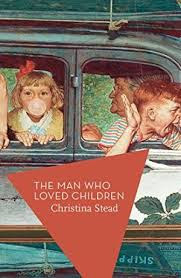
This is a book like none other I’ve ever read. The characters behave so badly, and express themselves so bizarrely, that I can only think it comes direct from life. Reading it is a bit like drinking at the firehose of family life – and not a very happy family at that.
The book tells the story of a family slowly losing their money. The father Sam is an idealist, selfish and self-centred as only idealists can be; the mother Henny is a bitter former debutante. The story mostly focuses on the eldest child, Louie, daughter of her father’s first marriage, and half-sister to the other five children in the family. Here’s a taster, the mother speaking of her step-daughter to the father:
She wanted to know whether Sam knew that his beautiful genius’ clothes were smeared with filth and that most of the time the great big overgrown wretch with her great lolloping breasts looked as if she’d rolled in pigsty or a slaughter house, and that she couldn’t stand the streams of blood that poured from her fat belly and that he must get someone else to look after such an unnatural big beast.
Sam had come into the house when Henny began her screams and stood their goggling, while Louie, going paer, stood petrified with horror and pride, looking reproachfully at her father and expecting him to scold Henny. But Sam goggled like some insignificant wretch crept in secretly on the Eleusinian mysteries, frightened but licking his lips.
Or here’s the mother – Henny on her inlaws:
Henny smirked even more, seeing the wilcat, hedgerow, wild-weed, slum-artisan, cheap-Baltimore family grow more jolly; seeing Ebby, poor ship’s carpenter, who had an imbecile for a wife and one doddle-headed child, and gaptoothed Benbow, with that strumpet girl, Leslie (as Henny put it), and two dumb boys, and old soak Charles, and garage owner Peter (who had actually begun with a junk car and three cowbells collecting old bedsprings and fat women’s bulging corsets!), and Bonnie (obviously sleeping with some man who was doing her the dirt) and Jinny (whose pert daughter Essie needed her face slapped) and Jo (whose hair was like a haystack in a fit) and all their weedy, rank children getting merrier and merrier on the dungheap that was their life. Born in the muck, thriving in the muck, and proud of the muck, thought Henrietta!
The narrative is full of invention. Here’s the children, running from their parents fighting: ” . . . seemed not to take the slightest interest in the obscene drama played daily in their eyes and ears, but, like little fish scuttling before the disturbing oar, would disappear mentally and physically into the open air or into odd corner of the house”. Or here’s how she describes a note arriving to Louie during class: “by desk express”
It’s a fabulous book. It ends SPOILER ALERT with Louie attempting to kill her parents with poison, and succeeding with her step-mother. A tribute to the quality of the book is that this seems completely like a realistic and understandable thing to do, rather than like unhinged melodrama.
Jonathan Franzen said this about the novel: “This novel . . . is one of the great literary achievements of the twentieth century. I carry it in my head the way I carry childhood memories; the scenes are of such precise horror and comedy that I feel I didn’t read the book so much as live it.”
I think I agree with him. I am not sure why THE MAN WHO LOVED CHILDREN is not better known. Perhaps it’s proof, if more were needed, that life is after all not fair.

Interesting review… some books are made popular when it is much talked about. Others are experienced individually.